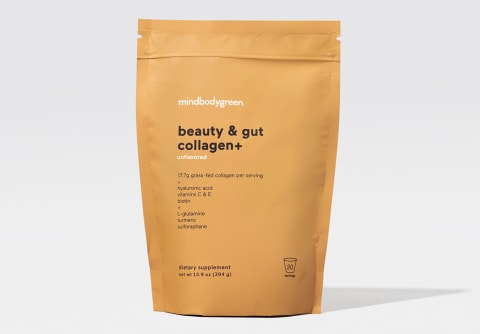Advertisement
How Long Does It Take For Collagen To Work? Our Complete Guide


Ashley Jordan Ferira, Ph.D., RDN is Vice President of Scientific Affairs at mindbodygreen. She received her bachelor's degree in Biological Basis of Behavior from the University of Pennsylvania and Ph.D. in Foods and Nutrition from the University of Georgia.
When you incorporate a new supplement into your routine, it's only natural to expect results. But how fast do those results show up?
Well, that may take a bit more patience. Now, there are some things you can expect to see rather quickly—we'll explain soon—but for the full benefits, be sure to give your supplements enough time before you make the final call on their efficacy.
Here, we dive into why you may want to take a collagen supplement, how long it takes to see results per each health support area, and the various things that may affect these timelines.
Why take collagen?
Experts and users cite many reasons they include a collagen supplement in their routine. Perhaps, you, too, have heard some of the below, which have piqued your interest in the supplement—and maybe even brought you to this story.
See, the health claims made vary quite a bit because collagen is a protein1 naturally found in many areas of the body, including the skin, muscles, joints, and gut.
(In fact, there are at least 28 kinds of collagen2 that we know of that exist in vertebrates, which includes us)—however, collagen types I through III are the most common.
We naturally produce collagen via our cells' fibroblasts, but said product decreases over time. For this reason, many people try to support their natural levels via collagen powders, pills, and elixirs.
Here are several of the science-backed benefits of collagen that you can expect*:
Skin health support
"It can help with skin wrinkling, providing the skin one of its basic ingredients to stay firm and taut," says Taz Bhatia, M.D., an integrative medicine physician and mbg Collective member.*
The research 3shows that these collagen peptides are able to support skin elasticity and dermal collagen density3.*
How? Well hydrolyzed collagen peptides have been shown to help promote your body's natural production of collagen4 and other molecules that make up the skin, like elastin and fibrillin.* Particularly hydrolyzed collagen peptides help the skin.*
Gut
One of the reasons collagen supplements have become so widespread is the potential gut health benefits.*
Research has found that blood levels of certain types of collagen are lower in individuals with digestive challenges5.
It turns out that one of the main amino acids in collagen, L-glutamate, supports digestive health because it's a major fuel source6 for the cells in the intestine.*
Our gut lining also uses proline and glycine for energy.* These are two additional amino acids found in collagen.
Joints
Collagen type II is a common structural component of our joints. One randomized clinical trial found that people who took a type II collagen supplement for 180 days saw support in their physical function and helped improve joint stiffness.*
Another study showed that athletes who regularly took collagen experienced support for their overall joint health and comfort7.* Finally one meta-analysis, which combined data from five clinical studies, found that collagen supplements supported joint stiffness8 but didn't improve their comfort level or physical function.*
Muscles
Collagen is not a complete protein because it's missing tryptophan, one of the nine essential amino acids. But it still delivers close to 20 unique amino acids and can support muscle mass, particularly when combined with exercise. (See, collagen makes up 1 to 10% of muscles.)
In one small human study, men who took collagen daily while participating in an exercise program gained more muscle mass9 than those who only did the exercise program.*
Hair and nails
Less research has been done on collagen's other beauty benefits—those being for hair and nails—but experts suggest that it may help their health.
First up, nails: One study found that when patients took collagen daily for 24 weeks, it helped support their nail health10, including better growth rates, reduced breakage, and improved appearance.*
For hair, the connection is more theoretical. Hair is mainly made up of the protein keratin and structural lipids11. For the body to build keratin, it needs several types of amino acids, many of which are part of collagen peptides12. In fact, the main amino acid in keratin is proline, which is found in collagen peptides as well.
So how long does it take for collagen to work? A summary.
If you want nothing but the time frames, here's what the most current and best research suggests for results:
- Skin support benefits: 4 to 12 weeks (1 to 3 months)
- Muscle mass and strength (combined with resistance training): 3 months
- Less soreness after physical training: within a few days
- Joint health support: 4 to 6 months
- Tendon support (combined with strengthening exercise): 3 to 6 months
- Bone-density support: 12 months
- Hair: unclear
- Nails: 24 weeks
How long does it take for collagen to work for skin?
For skin benefits, 12 weeks is a common duration according to robustly designed research. For example, this study found that the patients taking a collagen supplement experienced enhanced skin elasticity, hydration, and density13.*
Another found that respondents experienced smoother skin texture14.* This study measured skin-related outcomes (such as hydration, elasticity, and wrinkles) at both six and 12 weeks, with significant results15 at the latter.*
Some studies suggest you may be able to see results sooner. This study said they found statistically significant skin elasticity enhancement 16at four weeks.* Another suggests that results were even greater at eight weeks17.*
Finally, this study measured the skin markers at two, four, six, and eight weeks—with noticeable results at six and eight weeks18 but not before.*
Essentially, you may see improvements within the second month of use, but for full results, you should stick with it until at least three months. That's what the science says.
How long does it take for collagen to work for the joints and tendons?
If you are looking for joint support, it may take anywhere from 12 weeks to six months.
For more localized joint support, studies show you may see results in 12 weeks: This study found a positive impact on joint mobility in the 12-week time frame19; additionally, this study found that patients experienced knee-health support in 13 weeks20.*
But for broader, global joint support, the studies suggest it will likely take longer. One study found that patients saw enhanced overall joint health21 at the six-month marker.*
For tendons and ligaments, research suggests you can see benefits in three to six months22.* One study found that when collagen supplementation was combined with strengthening exercise, the participants saw enhanced tendon function and performance in three months23.*
How long does it take for collagen to work on muscles?
Muscles' time frame varies, depending on the intended result studied. For a typical level of muscle soreness after strenuous exercise, this study found that you may see benefits by Day 224.*
However, for enhanced muscle mass from collagen protein (peptides and amino acids), it will take about three months when combined with resistance training.
For example, one study that focused on perimenopausal women found that the participants experienced a positive impact on body composition and regional muscle strength25.* Another study conducted in older men also observed benefits for their body composition and muscle mass26.*
Finally, research in recreationally active adult men finds that collagen supplementation supports body composition27 as well as skeletal muscle28.*
How long does it take for collagen to work on the bones?
Given how long the natural, physiological timeline for bone turnover is, the research shows that you won't see effects for up to a year.
This is why many clinical studies researching bone health follow participants for up to one year, or sometimes beyond.
For example, this study found that postmenopausal women showed enhanced bone density29 at 12 months after consuming collagen peptides daily for a year.*
How long does it take for collagen to work for hair and nails?
For hair, there is no direct time frame in which you can expect to see results as there simply isn't enough research to confirm at this time.
For nails, the studies available were measured at 24 weeks30, and they showed enhanced nail strength and improvements in brittleness.*
- Ashley Jordan Ferira, Ph.D., RDN is Vice President of Scientific Affairs at mindbodygreen.
- Taz Bhatia, M.D., is an integrative medicine physician and mbg Collective member.
- Nour Zibdeh, M.S., RDN, CLT, is a functional and integrative dietitian and nutritionist, author, and speaker.
- Joshua Zeichner, M.D., is an Associate Professor of Dermatology and the Director of Cosmetic & Clinical Research in Dermatology at Mount Sinai Hospital in New York City.
What can affect how fast it works?
Not all collagen is created equal—and nobody is the same. So some things will affect the efficacy and how fast you'll see the results. Here are a few:
- Dosage. Of course you can't expect results if you don't ingest the proper dosage daily. Be sure to find a collagen supplement with a sufficient amount of collagen (in the 10- to 20-gram range) and use it as instructed. While this range is a helpful guide, it's important to note that lower doses supported by science (like for UC-II collagen) can also support key health areas. The dose should be rooted in science.
- Diet. Collagen is not a complete protein, as it does not contain all nine essential amino acids (again, just missing tryptophan but lower in some others, too). So collagen should be considered complementary to a diet otherwise filled with other healthy proteins from high-quality, complete sources.
- The type of collagen. Given that different types of collagen have different functions throughout the body, you should pick collagen products based on your needs. If you are looking for joint help, look for type II. For gut, skin, and overall full-body benefits, look for types I and III.
What is the best form of collagen to take?
Always look for hydrolyzed collagen peptides. "Collagen is a complex protein made of three chains of amino acids, whereas hydrolyzed collagen is collagen that is broken down into small protein chains, called collagen peptides, that are made of a few amino acids," explains Nour Zibdeh, M.S., RDN, CLT.
See, collagen by itself is too large of a molecule to be absorbed by the body. But when broken down into the peptides, your body is able to easily digest and utilize it.*
"Hydrolyzed collagen is predigested, so it does not go through that first-pass digestion in the GI tract," says board-certified dermatologist Joshua Zeichner, M.D. "The collagen fragments can be absorbed as is and circulate throughout the body to exert their effects."
The takeaway
Collagen is an incredibly beneficial supplement—one that has essential functional roles and benefits for the full body.*
However, just how fast you'll see those benefits varies depending on the health support area, collagen dose and type, underlying nutrition/diet, and your unique genetic makeup.
30 Sources
- https://www.ncbi.nlm.nih.gov/labs/pmc/articles/PMC6835901/
- https://www.ncbi.nlm.nih.gov/pmc/articles/PMC3003457/
- https://jddonline.com/articles/dermatology/S1545961619P0009X
- https://www.ncbi.nlm.nih.gov/pmc/articles/PMC3583892/
- https://pubmed.ncbi.nlm.nih.gov/14600124/
- https://www.karger.com/Article/FullText/494777
- https://www.ncbi.nlm.nih.gov/pubmed/18416885
- https://link.springer.com/article/10.1007/s00264-018-4211-5
- https://www.ncbi.nlm.nih.gov/pmc/articles/PMC4594048/
- https://www.ncbi.nlm.nih.gov/pubmed/28786550
- https://www.ncbi.nlm.nih.gov/pmc/articles/PMC4201279/
- https://www.sciencedirect.com/science/article/pii/S0079642515000596
- https://www.ncbi.nlm.nih.gov/pmc/articles/PMC6835901/
- https://pubmed.ncbi.nlm.nih.gov/28528342/
- https://pubmed.ncbi.nlm.nih.gov/29949889/
- https://pubmed.ncbi.nlm.nih.gov/23949208/
- https://pubmed.ncbi.nlm.nih.gov/24401291/
- https://pubmed.ncbi.nlm.nih.gov/32195722/
- https://pubmed.ncbi.nlm.nih.gov/30122200/
- https://pubmed.ncbi.nlm.nih.gov/24852756/
- https://pubmed.ncbi.nlm.nih.gov/26822714/
- https://pubmed.ncbi.nlm.nih.gov/29769831/
- https://pubmed.ncbi.nlm.nih.gov/30609761/
- https://pubmed.ncbi.nlm.nih.gov/30783776/
- https://pubmed.ncbi.nlm.nih.gov/31010031/
- https://pubmed.ncbi.nlm.nih.gov/26353786/
- https://pubmed.ncbi.nlm.nih.gov/31126103/
- https://pubmed.ncbi.nlm.nih.gov/31091754/
- https://pubmed.ncbi.nlm.nih.gov/29337906/
- https://pubmed.ncbi.nlm.nih.gov/28786550/
Watch Next
Enjoy some of our favorite clips from classes
Enjoy some of our favorite clips from classes
What Is Meditation?
Mindfulness/Spirituality | Light Watkins
Box Breathing
Mindfulness/Spirituality | Gwen Dittmar
What Breathwork Can Address
Mindfulness/Spirituality | Gwen Dittmar
The 8 Limbs of Yoga - What is Asana?
Yoga | Caley Alyssa
Two Standing Postures to Open Up Tight Hips
Yoga | Caley Alyssa
How Plants Can Optimize Athletic Performance
Nutrition | Rich Roll
What to Eat Before a Workout
Nutrition | Rich Roll
How Ayurveda Helps Us Navigate Modern Life
Nutrition | Sahara Rose
Messages About Love & Relationships
Love & Relationships | Esther Perel
Love Languages
Love & Relationships | Esther Perel


















